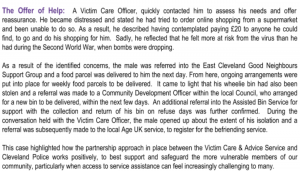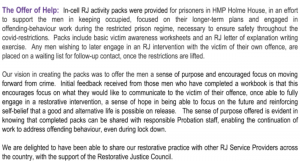Restorative Cleveland: Adapting practice in response to Covid-19
Restorative Cleveland – adaptation of service delivery: increased flexibility, creativity and responsivity to victim care, offender rehabilitation and the promotion of safer communities.
Safer Communities (formerly Safe in Tees Valley) are a community safety charity, established in 1996. Our vision is to work in partnership to make communities safer, support victims of crime and create opportunities to change lives for the better. We pride ourselves on providing high-quality support, interventions and programmes that deliver significant life-changing differences for those who engage in our services.
Our Strategic objectives include our focus to:
- Provide a positive future for children and young people.
- Transform the lives of victims of crime and support them to cope and recover.
- Create safe and sustainable communities.
Our projects are proud to deliver services across Cleveland and County Durham; supporting victim care following crime, offender rehabilitation and community reintegration, youth engagement, advice and support for victims of sexual violence and host to the Cleveland Police Cadets Programme. We want anyone who has experienced or been impacted by crime, to know you have a voice and we are here to help.
Throughout the Covid-19 lockdown, our victim services have remained operational, further including offender intervention through our Restorative Justice service; aimed to address the underlying causes of criminality, the reduction of re-offending and the prevention of further victims of crime. The coronavirus pandemic has proven to be a challenging experience for us all, wherever we are in the world; impacting on all communities and emphasising the essential need to safeguard our most vulnerable, elderly and isolated community members, more than ever. In taking care to best support the health and well-being of individuals accessing our services, face-to-face contact is currently on hold; as we contribute to the larger effort in keeping everyone as safe and well as possible. As such, our use of indirect contact methods have continued to develop, as we embrace the technological and digital world of communication, as a united community.
In order to responsively meet any identified needs and areas of risk, clear and effective communication with the individuals we work with, our fantastic partner agencies and with each other is the one aspect of our practice that will never change. We are all learning important good practice and life lessons during this crisis but positively, many of these we would like to maintain moving forward. The world does not sit still and neither do our communities; maintaining support provision and finding new and innovative means of practice, enables victims of crime to remain at the forefront of the Criminal Justice System and the focal point of all practitioners in the field. Exactly, where we believe they should be, in working towards safer communities for all.
The services provided by Safer Communities continue to practice, with these aims in mind. Our Teesside Sexual Assault & Referral Service continues to provide a 24/7 service for anyone who has experienced rape, sexual assault or other sexual abuse. Safe measures are in place within the Centre, to enable the continuation of essential support and guidance, throughout the lockdown period.
Victim Care & Advice Service
The Victim Care & Advice Service (VCAS) offer emotional and practical support and advice to anyone affected by crime. In order to continue providing a dedicated and individualised service, we have concentrated on the continued availability of telephone-based support, enabling us to reach those needing our assistance and to maintain communication in the safest way possible. Continually looking for new ways to work and communicate, remains an integral part of our practice and in aiming to achieve this, individuals are assisted in identifying whichever form of indirect communication, suits them best.
Keeping everyone safe, whilst enabling access to support with emotional and psychological well-being, encapsulates good practice in victim care at all times, and especially now. This has extended to include contact with individuals previously supported by the Service and identified as ‘vulnerable by way of age.’ These further contact attempts are logged as ‘kindness calls,’ as the Victim Care Officers essentially undertake welfare checks and provide signposting information in relation to additional service support, in an effort to ensure all identified needs and vulnerabilities are addressed.
One instance in which this was achieved relates to the safeguarding of an 81-year-old male. A referral was made to the VCAS Support Worker based in the Police control room, following an abandoned 999 call he had attempted to make. The male, from the Redcar and Cleveland area, had rang in to state he lived alone and said he felt particularly vulnerable and at risk, due to the ongoing pandemic…

Restorative Cleveland
During this period, our Restorative Justice service, ‘Restorative Cleveland’ have also continued to support those affected by crime, in the safest way possible. Restorative Justice, is quite simply, communication. In the context of the Criminal Justice System, communication takes place between an individual harmed by a crime or conflict and the individual responsible for having caused the harm. Typically, this can occur in various ways; directly between a victim of crime and the responsible offender, in the form of a face to face meeting, or indirectly through letter-writing, messages passed through a third party or via a recording. Whilst currently unable to offer face to face contact in light of the Covid-19 restrictions, individuals can continue to access a range of indirect methods of communication and support, with the aim of repairing the harm caused and finding a positive way forward from the incidence of crime. Whichever communication option is chosen by those involved, all communication is voluntary and both parties are supported by our service.
Naturally, the coronavirus pandemic has increased use of indirect methods of communication and we remain mindful of the importance in undertaking appropriate precautions, designed to best support the well-being of engaged parties. Adapting our delivery to include more creative and accessible methods has proven especially relevant to our restorative practice within local prisons. Behind bars, it appears evident that the lockdown has the potential to negatively impact on the well-being and continued focus of inmates, wishing to work towards positive change.

Throughout the crisis to date, what has stood out most for our organisation, is the true value in maintaining and offering access to communication. Even during the most challenging of times, those harmed by crime should always remain at the centre of our efforts to support recovery. The need to provide effective victim care, promote offender rehabilitation, community reintegration and the repair of harm caused, in truly working to make our communities safer, will always prevail.
You can make a real difference and help us to continue delivering our essential work, by donating through KindLink, Give as you Live and AmazonSmile.
Whichever method you use, we thank you!

Article by Becky Childs, Service Manager for Restorative Cleveland, part of Safer Communities.
Please follow and like us:
Share this:
Restorative Cleveland: Adapting practice in response to Covid-19
Restorative Cleveland – adaptation of service delivery: increased flexibility, creativity and responsivity to victim care, offender rehabilitation and the promotion of safer communities.
Safer Communities (formerly Safe in Tees Valley) are a community safety charity, established in 1996. Our vision is to work in partnership to make communities safer, support victims of crime and create opportunities to change lives for the better. We pride ourselves on providing high-quality support, interventions and programmes that deliver significant life-changing differences for those who engage in our services.
Our Strategic objectives include our focus to:
Our projects are proud to deliver services across Cleveland and County Durham; supporting victim care following crime, offender rehabilitation and community reintegration, youth engagement, advice and support for victims of sexual violence and host to the Cleveland Police Cadets Programme. We want anyone who has experienced or been impacted by crime, to know you have a voice and we are here to help.
Throughout the Covid-19 lockdown, our victim services have remained operational, further including offender intervention through our Restorative Justice service; aimed to address the underlying causes of criminality, the reduction of re-offending and the prevention of further victims of crime. The coronavirus pandemic has proven to be a challenging experience for us all, wherever we are in the world; impacting on all communities and emphasising the essential need to safeguard our most vulnerable, elderly and isolated community members, more than ever. In taking care to best support the health and well-being of individuals accessing our services, face-to-face contact is currently on hold; as we contribute to the larger effort in keeping everyone as safe and well as possible. As such, our use of indirect contact methods have continued to develop, as we embrace the technological and digital world of communication, as a united community.
In order to responsively meet any identified needs and areas of risk, clear and effective communication with the individuals we work with, our fantastic partner agencies and with each other is the one aspect of our practice that will never change. We are all learning important good practice and life lessons during this crisis but positively, many of these we would like to maintain moving forward. The world does not sit still and neither do our communities; maintaining support provision and finding new and innovative means of practice, enables victims of crime to remain at the forefront of the Criminal Justice System and the focal point of all practitioners in the field. Exactly, where we believe they should be, in working towards safer communities for all.
The services provided by Safer Communities continue to practice, with these aims in mind. Our Teesside Sexual Assault & Referral Service continues to provide a 24/7 service for anyone who has experienced rape, sexual assault or other sexual abuse. Safe measures are in place within the Centre, to enable the continuation of essential support and guidance, throughout the lockdown period.
Victim Care & Advice Service
The Victim Care & Advice Service (VCAS) offer emotional and practical support and advice to anyone affected by crime. In order to continue providing a dedicated and individualised service, we have concentrated on the continued availability of telephone-based support, enabling us to reach those needing our assistance and to maintain communication in the safest way possible. Continually looking for new ways to work and communicate, remains an integral part of our practice and in aiming to achieve this, individuals are assisted in identifying whichever form of indirect communication, suits them best.
Keeping everyone safe, whilst enabling access to support with emotional and psychological well-being, encapsulates good practice in victim care at all times, and especially now. This has extended to include contact with individuals previously supported by the Service and identified as ‘vulnerable by way of age.’ These further contact attempts are logged as ‘kindness calls,’ as the Victim Care Officers essentially undertake welfare checks and provide signposting information in relation to additional service support, in an effort to ensure all identified needs and vulnerabilities are addressed.
One instance in which this was achieved relates to the safeguarding of an 81-year-old male. A referral was made to the VCAS Support Worker based in the Police control room, following an abandoned 999 call he had attempted to make. The male, from the Redcar and Cleveland area, had rang in to state he lived alone and said he felt particularly vulnerable and at risk, due to the ongoing pandemic…
Restorative Cleveland
During this period, our Restorative Justice service, ‘Restorative Cleveland’ have also continued to support those affected by crime, in the safest way possible. Restorative Justice, is quite simply, communication. In the context of the Criminal Justice System, communication takes place between an individual harmed by a crime or conflict and the individual responsible for having caused the harm. Typically, this can occur in various ways; directly between a victim of crime and the responsible offender, in the form of a face to face meeting, or indirectly through letter-writing, messages passed through a third party or via a recording. Whilst currently unable to offer face to face contact in light of the Covid-19 restrictions, individuals can continue to access a range of indirect methods of communication and support, with the aim of repairing the harm caused and finding a positive way forward from the incidence of crime. Whichever communication option is chosen by those involved, all communication is voluntary and both parties are supported by our service.
Naturally, the coronavirus pandemic has increased use of indirect methods of communication and we remain mindful of the importance in undertaking appropriate precautions, designed to best support the well-being of engaged parties. Adapting our delivery to include more creative and accessible methods has proven especially relevant to our restorative practice within local prisons. Behind bars, it appears evident that the lockdown has the potential to negatively impact on the well-being and continued focus of inmates, wishing to work towards positive change.
Throughout the crisis to date, what has stood out most for our organisation, is the true value in maintaining and offering access to communication. Even during the most challenging of times, those harmed by crime should always remain at the centre of our efforts to support recovery. The need to provide effective victim care, promote offender rehabilitation, community reintegration and the repair of harm caused, in truly working to make our communities safer, will always prevail.
You can make a real difference and help us to continue delivering our essential work, by donating through KindLink, Give as you Live and AmazonSmile.
Whichever method you use, we thank you!
Article by Becky Childs, Service Manager for Restorative Cleveland, part of Safer Communities.
Looking Forward: Why CSR Is More I...
Mental health, Covid-19, and the r...
KindLink Global Team
contact@kindlink.global
Saving a community in Angola b...
Empowering refugees through kn...
Building confidence in young p...